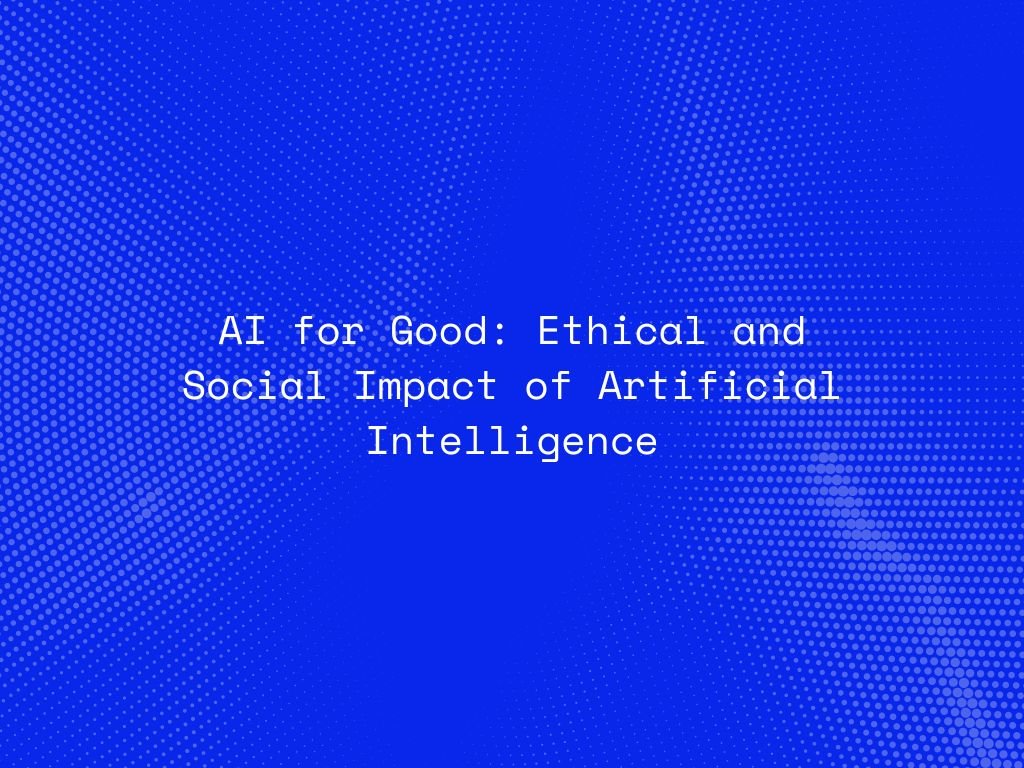Artificial Intelligence (AI) is transforming our world in profound ways, offering immense potential for solving complex problems and improving quality of life. However, as AI becomes increasingly integrated into various aspects of society, it is crucial to consider its ethical and social impacts. This blog explores how AI can be used for good, the ethical considerations involved, and the potential social impact of AI technologies.
The Potential of AI for Good
AI has the capability to address some of the most pressing challenges facing humanity. Here are a few ways AI is being leveraged for positive social impact:
1. Healthcare
AI is revolutionizing healthcare by enhancing diagnostics, treatment planning, and patient care. AI-powered systems can analyze medical images with high accuracy, predict disease outbreaks, and personalize treatment plans. For example, AI algorithms can detect early signs of diseases like cancer and diabetes, significantly improving patient outcomes.
2. Education
In education, AI can provide personalized learning experiences, helping students to learn at their own pace and style. Intelligent tutoring systems can adapt to individual learning needs, while AI-driven analytics can identify students at risk of falling behind, allowing for timely interventions.
3. Environmental Sustainability
AI is being used to tackle environmental issues such as climate change, wildlife conservation, and resource management. AI models can predict environmental changes, optimize energy usage, and monitor ecosystems. For instance, AI-powered drones are used to track and protect endangered species, while smart grids optimize electricity distribution, reducing waste.
4. Humanitarian Aid
In the realm of humanitarian aid, AI can assist in disaster response, resource allocation, and crisis management. AI systems can analyze satellite imagery to assess disaster impact, predict areas at risk, and coordinate relief efforts more efficiently. Additionally, AI chatbots can provide vital information and support to people in crisis situations.
Connect With Us
Ethical Considerations in AI
While the potential benefits of AI are significant, there are important ethical considerations to address:
1. Bias and Fairness
Bias in AI systems can lead to unfair and discriminatory outcomes. It is essential to ensure that AI models are trained on diverse and representative datasets and to implement techniques to mitigate bias. Ongoing monitoring and evaluation are necessary to ensure fairness and equity.
2. Transparency and Accountability
Transparency in AI decision-making processes is crucial for building trust and accountability. AI systems should be designed to provide clear explanations for their decisions and actions. Moreover, there should be mechanisms in place to hold developers and users accountable for the ethical use of AI.
3. Privacy and Security
Privacy and security are paramount in AI applications, particularly those involving personal data. Robust data protection measures must be implemented to prevent unauthorized access and misuse of data. Additionally, AI systems should adhere to regulations and standards that safeguard individuals’ privacy rights.
4. Employment and Economic Impact
The impact of AI on employment and the economy raises concerns about job displacement and inequality. It is important to develop strategies for workforce transition, including retraining and upskilling programs, to ensure that the benefits of AI are broadly shared and do not exacerbate existing inequalities.
Social Impact of AI
The social impact of AI extends beyond individual applications to broader societal changes:
1. Enhanced Accessibility
AI technologies can improve accessibility for individuals with disabilities, enabling greater participation in society. Voice-activated assistants, real-time transcription services, and AI-driven assistive devices enhance communication, mobility, and independence for people with disabilities.
2. Improved Public Services
AI can enhance the efficiency and effectiveness of public services, such as transportation, public safety, and social services. Predictive analytics can optimize traffic management, while AI-driven crime analysis can support law enforcement in preventing and solving crimes.
3. Strengthening Communities
AI has the potential to strengthen communities by facilitating better communication, collaboration, and resource sharing. Community-based AI applications can help identify and address local needs, promote social cohesion, and support grassroots initiatives.
Moving Forward: Strategies for Ethical AI Development
To harness the benefits of AI while mitigating its risks, it is essential to adopt strategies for ethical AI development:
1. Inclusive Design
AI systems should be designed inclusively, considering the needs and perspectives of diverse user groups. Engaging stakeholders from different backgrounds in the design and development process helps ensure that AI technologies are equitable and beneficial to all.
2. Ethical Frameworks and Guidelines
Developing and adhering to ethical frameworks and guidelines for AI development is critical. Organizations should establish clear ethical principles, such as fairness, transparency, and accountability, and integrate them into their AI practices.
3. Collaboration and Regulation
Collaboration between industry, academia, government, and civil society is necessary to address the ethical and social challenges of AI. Policymakers should work with stakeholders to develop regulations and standards that promote the responsible use of AI while fostering innovation.
4. Continuous Monitoring and Evaluation
AI systems should be continuously monitored and evaluated to ensure they meet ethical standards and achieve desired social outcomes. This includes regular audits, impact assessments, and feedback mechanisms to identify and address potential issues.
Conclusion
AI for Good holds tremendous potential to address societal challenges and improve quality of life across various domains. However, realizing this potential requires careful consideration of the ethical and social impacts of AI technologies. By adopting inclusive design practices, ethical frameworks, and collaborative approaches, we can ensure that AI development is aligned with the values of fairness, transparency, and accountability. As we continue to advance AI, it is our collective responsibility to harness its power for the greater good, creating a future where AI benefits all members of society.




